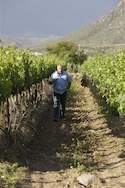Travels to Portugal followed. With that came the discovery of a marked resemblance between the climate and clay-based, shale soils of Calitzdorp and the terroir of the stony Douro Valley. The Port Champion, Carel Nel started planting the classic port varieties: touriga nacional, souzao, tinta roriz and tinta francisca, as well as more tinta barocca.

At the outset, the man whose unassuming mien belies a searching mind and a quiet insistence on doing things properly followed the traditional tenets of port production: proper port grape varieties; low, thick-walled, open concrete tanks or kuipe modelled on the Portuguese Lagares; natural fermentation and manual punch-downs; barrel maturation in 500-litre port 'pipes· and large vats; blending of different port wines; and further bottle ageing.
He made a study of different port styles (ruby, vintage, vintage reserve, tawny), intent on authenticity and quality. Carel is one of the early generation winemakers who, on top of his winemaking qualification, decided to do the Cape Wine Masters course in the early 1990s.
The local wine industry existed in isolation from international market trade, trends and expertise due to economic apartheid-era sanctions.
'The more you know, the better wine you make.' He recalls that working through the various diploma courses, tastings and lectures was like 'taking a tour through the entire wine world'.
Later travel was primarily to Portugal and France, where he negotiated an exchange programme with the Symington family of the eponymous group that owns some of the Douro's top port houses and brands, including Graham's and Warre's.
'Touriga is a great variety with a natural affinity for oak.'
Typical generosity of spirit and quiet passion for the product led to a dogged determination to up the quality of South African port, from a traditional early nineteenth-century single-dimensional fortified sweet drink made from any red wine variety to a drier, more complex, authentic wine style, made from dedicated port varieties, fit for the finest table.
Carel took fellow winemakers (including cousins Boets and Stroebel Ne! of neighbouring De Krans) with him on the road of experimentation and discovery.
In 1992 he and the late Theo Rudman founded the South African Port Producers Association, started the annual Calitzdorp Port and Wine Festival and instituted the Peter Schulz trophy awarded to the Cape's best port.
The big, mild-mannered Afrikaans Little Karoo wine grower and the short and portly, cigar-chomping, jazz-loving self-confessed sybarite were an unlikely, but impassioned pair of port lovers.
Today, the newly named Cape Port Producers Association (CAPPA), of which Carel regularly serves as chairman, has over 30 member winemakers, all dedicated to and successful in producing ports that have the Portuguese 'a little bit worried,' he says, with evident pride and the glimmer of a smile.
That smile masks huge frustration and effort involving ongoing international diplomacy. EU regulations, lobbied for by the famous Portuguese port houses in recent years, giving that region sole rights to the word 'port' on labels (much like the Champenoise did with Champagne), are being phased in.
Carel and his Cape cohorts fought and won, the initial battle against a similar constraint on port-style names on labels. And 'Cape' was allowed as a descriptor only for
South African ports, because there was a historic precedent.
Which is why CAPPA members have been establishing the use of 'Cape' in front of the various styles of bottled ports ('Ruby', 'Tawny', 'Vintage', and so on). Eventually, when the word 'port' has to be dropped from labels, consumers of a Cape Ruby or Cape Vintage Reserve will know that's a port in the bottle.
They should also know it's world-class stuff, especially in the case of Boplaas. 'Frightfully good,' pronounced a Symington on a recent visit, calling Boplaas 'a top New World port maker.
Says Carel: 'Probably the only thing separating South African ports from their Portuguese counterparts is in the type of spirits used for fortification. We don't want to replicate them; we want to make something distinctive.'
 Pears poached in port with ice cream and almond flakes recipe by Carel Nel....
Pears poached in port with ice cream and almond flakes recipe by Carel Nel.... Springbok loin wrapped in prosciutto recipe by Carel Nel paired with Boplaas Ring of Rocks or Boplaas Cape Vintage....
Springbok loin wrapped in prosciutto recipe by Carel Nel paired with Boplaas Ring of Rocks or Boplaas Cape Vintage....